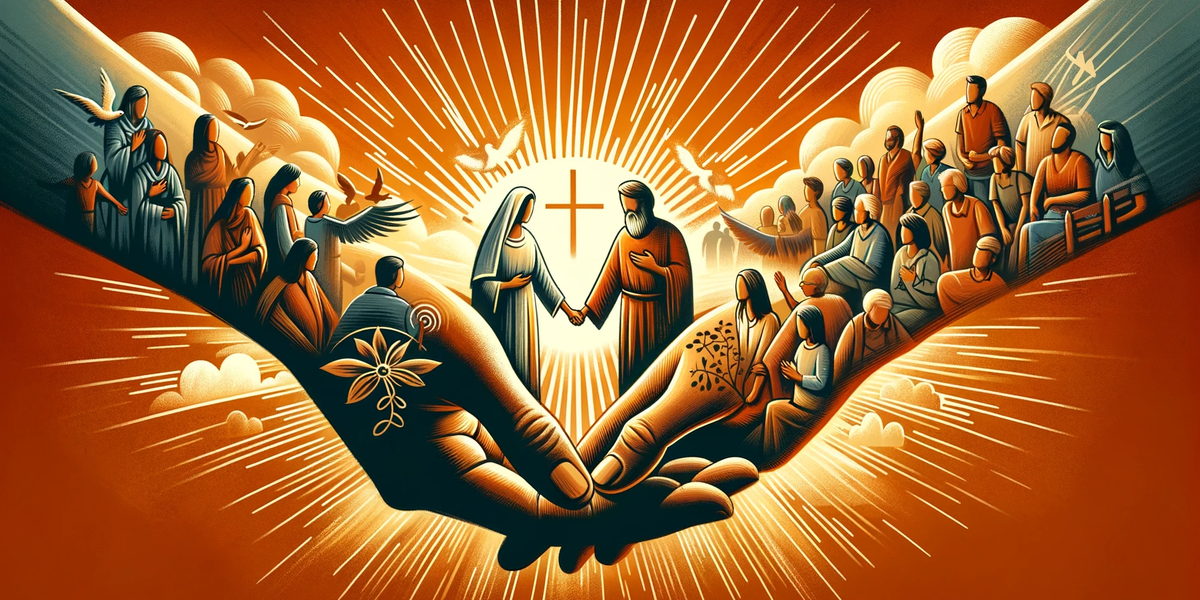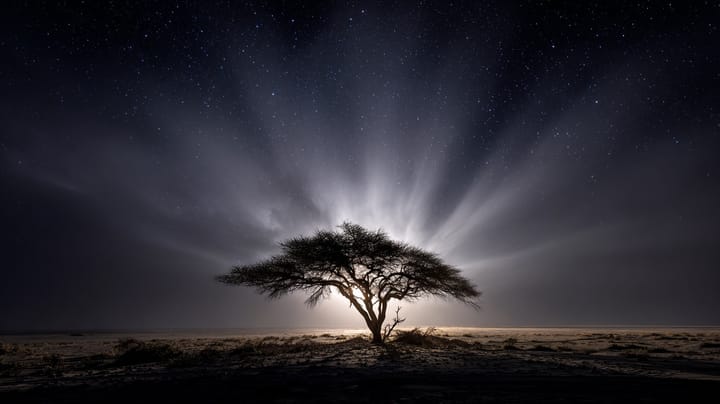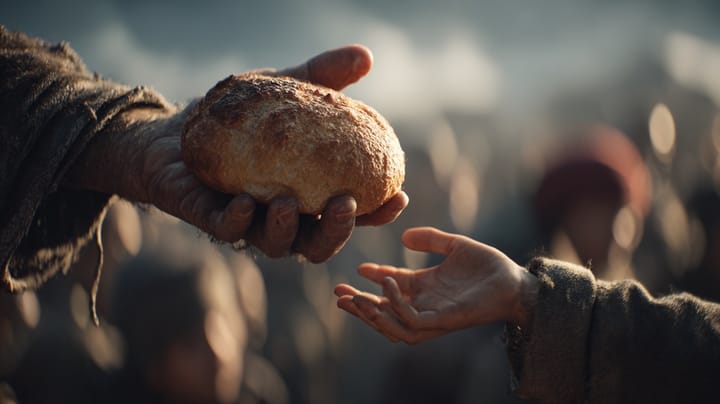Fairhaven Sermon 12-10-2023
Loneliness, a modern epidemic, is countered by Christian community, echoing Mary and Elizabeth's deep connection in God's kingdom.

In This week's sermon, Pastor Dylan Parson addressed the issue of loneliness, intensified by the trend of hyper-individualism in American society. He referred to a Surgeon General report to highlight the health impacts of social isolation and the decline in community and church participation.
Pastor Dylan used the biblical story of Mary and Elizabeth to illustrate the importance of genuine connections. He emphasized the Christian responsibility to create a community reflecting the Trinity's interconnectedness, presenting it as a solution to loneliness through deep relationships.
Transcript
Earlier this year, and many of you might have heard about this, the Surgeon General released a major report. It's 82 pages, I skimmed it, on a new epidemic that is plaguing our country, as well as much of the industrialized Western world. It's not COVID, but COVID made it worse. It's not opioid drugs, which are actually more of a symptom of this even bigger problem.
This epidemic is loneliness. And that sounds kind of silly, maybe, if you don't take it seriously. Well, an epidemic of loneliness, yeah, what are you gonna do, die of being lonely? Well, yes, actually, it turns out that people are. Loneliness, which is defined as a feeling of isolation, and social isolation, which is like an objective measure, that you just don't have a lot of connections with people.
Those are proving to be really deadly. They increase the risk of premature death by 26 and 29%. And social isolation increases the risk of death as much as smoking 15 cigarettes every day. Heart disease increases 29%, strokes 32%, anxiety, depression, dementia, all those shoot up.
And all of these health consequences are worse for people who are old, for people who are poor, LGBT people, they're all disproportionately isolated. Anyone who works with people in addiction or knows anybody in addiction will tell you the isolation of the pandemic was a major factor in making 2021 the deadliest year for overdoses on record, five times what it was in 99. And this explosion of loneliness is the outcome of decades of trends in America, all kinds of different things that weave together like a really big web. Something has happened in our culture that is keeping people apart in ways that they never have been before.
We all know that churches have shrunk dramatically since the middle of the 20th century. Just in 1999, 70% of Americans considered themselves members of a church, a synagogue, a mosque, and now it's 47%, it's cut in half. And it's not just us, though, it's not just churches. Ask the Elks Club, the Freemasons, the Historical Society, the Bowling League, the Union, what their memberships have been since the 70s or so.
And Americans just don't even see their friends anymore. In 2003, most people socialized 60 minutes a day, an hour a day. And this, in 2020, which was before the pandemic, mind you, it's now 20 minutes a day, a third. We see our friends a third as much as we did just a few years ago.
Younger people are unlikely to get married, more unlikely than they've ever been. Single person households are double what they were in 1960. We are wildly isolated and it's killing us. And so what happened? How do these huge changes across all kinds of things happen? I would suggest, and a lot of researchers and theologians agree, that a big factor is there's a new spirit of hyper individualism.
This has become something that defines American life in a new way since the 80s or so, people are just extremely individualistic. And that means we spend our lives searching for personal success, for achievement above everything else. You gotta get what you need to get. You're your achievements, you build your destiny.
You are solely responsible for what happens to you. You can see how that can erode a sense of community if you gotta deal with yourself. As some of you with kids or grandkids might know, there's an entire career now called influencer. The whole job is to maintain your personal brand of being cool or interesting or beautiful on social media so you can sell stuff to other people who wanna be those things.
You can make millions of dollars doing that. This kind of individualism also means when it comes down to it, we're pretty much on our own, sink or swim. And that's terrifying. There's an author, Malcolm Harris, who wrote a book called Kids These Days, which he's mentioned is surprisingly popular among pastors, especially youth pastors.
And one of his key points is that pretty much from birth, American kids are groomed into being successful future employees. And if you think about it, right? Suppose you're the parent of a middle schooler today. Considering how to use your kids two days off of school per week. Travel soccer looks a lot better on a college application than being an acolyte in church.
Looks a lot better than going on a nice walk with your mom and dad in the neighborhood or in the woods. And a kid learns really young, elementary school. You gotta get all those extracurricular activities you can. Build up that resume.
You gotta do well on all your state tests that distill all the wonders you've learned into multiple choice questions and five paragraph essays. Why? Well, so you can get into a good college. Suppose you're passionate about theater or English or history. Well, too bad, get a major that's practical.
So you look good on the job market. What does that feel like when you're in sixth grade? You gotta do that so you get a well-paying job that tend to your student loans to pay your mortgage. You don't have to live in fear of poverty, even though most of us are a couple bad months away from it anyhow. This is life as a frantic, desperate climb.
And you no wonder that people are anxious and depressed in addition to being lonely. But there is good news. The gospel of Jesus Christ offers an alternative to a life where we're all just individuals above all things. That's not what we see in the gospel.
That's not what we see today with Mary and Elizabeth. We see a very different world. The British Prime Minister Margaret Thatcher had this famous quote where she said, there's no such thing as society. There's individual men and women.
But in God's kingdom, that's not the case. There's so much more than that. We're not just every man for themselves. There's a love much bigger, much deeper, an entire society, a community built of people loving one another deeply and wholly because that's the way God has loved us.
Our theme this morning, the second Sunday in Advent, is we find joy in connection. But because we read about Mary and Elizabeth doing exactly that, they found joy together in one another's joys. But of course, you might have noticed this is the Sunday we light the peace candle. This is very confusing as Peg and I were talking about how to prepare.
But that's because we find joy and peace and wholeness in connection with one another. God made us this way. God made us for relationship, for connection, as hard as it is, as countercultural as that is nowadays. I've described to you the reality of American life in 2023.
It's lonely, it's unhealthy, it's individualistic, but we are made for more than that. God said this in Genesis 2, before there were any human societies, before there were any cities or communities or countries, before creating a partner for Adam, God said, it is not good that the human being is alone. Even the Holy Trinity, God as three in one. God is community, Father, Son, and Holy Spirit together since before the beginning.
The church is intended to be a place built around a completely different way of life than the world around us, a place that conquers loneliness, that conquers disconnection. After all, the way it's described throughout the New Testament, Paul loves to say about how the church is the body of Christ. Not just a bunch of separate individuals together who come and gather on Sundays and then scatter apart, but members of one body. Like a hand, like a foot, like an eye, all working together for a common purpose.
That's very different. Our lives as the church together should be lived in resistance to the lonely way of life that's killing our society. We are supposed to be a home for the people that are lonely and have no other home. The key figures in our gospel text this morning, Elizabeth and Mary, these are profound examples of what that resistance looks like.
They too are living a witness that's completely different than the world around them. Note that these two women are not important or powerful or influential at all. These are not merchants or nobles or senators in Rome. These are not generals of the Roman army.
These are just two Jewish women. They're members of a second class people. They're not even Roman citizens. And they're living under Roman domination.
They are powerless. They don't get to vote. And Elizabeth, she's an old lady. She's lived her whole life in the shadow of infertility.
She's likely been surrounded by a constant implication that she did something to deserve it. That's how people thought back then, that infertility was a curse. You must have done something that you're not having children. Imagine the loneliness that she's moved through her life childless.
She's watched from the sidelines as her sisters, as her friends, raise babies into adults and have families of their own. She's pregnant now. Finally, but now that's even almost more isolating. Her husband, meanwhile, has been struck silent for unbelief.
The angel told Zechariah, you'll have a son. Zechariah didn't believe him. The angel shut Zechariah up. Now Mary, Elizabeth's niece, she is a young Jewish peasant girl.
She's even less significant than her aunt. You know Elizabeth, at least, is married to a member of the priesthood. But these are two women on the margins. They're not important.
They're the kind of people who barely register to the rich and to the mighty. And now Mary's position has gotten even rockier. After a visit from an angel of the Lord, Mary, unmarried, though engaged to Joseph, she's pregnant. And as far as those around her are gonna be concerned, that makes her an adulteress.
She's a sinner whose sin will be visible. Her belly's gonna grow, everyone's gonna see. And if Joseph leaves, she's essentially unmarriageable for life. She's never gonna find a husband.
But she has chosen to do what God has asked her to do, and does so with one of the most beautiful affirmations in scripture. Something I hope that I could say to God. I am the Lord's servant. Let it be with me just as you have said.
She didn't understand. She didn't know what was gonna happen. But let it be with me just as you have said. She wants to do this.
She believes that all the angel has told her is true. The child she will bear will be the one who will save her people and will be the son of God. But still, as good as all that is, as wonderful as all that is, imagine what an unimaginably lonely position. It's not like she can just tell her friends and acquaintances what's happened and they'll buy it.
I'm pregnant from the Holy Spirit. Okay. Now the gospel doesn't tell us why. But the moment that the angel leaves after telling Mary this wonderful news, Mary hurries to go see Elizabeth.
For some reason, she just knows that's where she has to be. Tradition holds, Mary lived in Nazareth, obviously, but Elizabeth and Zechariah lived in a village called Ein Karem. Since Zechariah was a priest, it was just outside Jerusalem in the highlands. That's 100 miles from Nazareth.
It's not like Elizabeth is next door or the next town over. Something drives Mary to go see, of all people, her Aunt Elizabeth 100 miles away. Now we don't even know, scripture doesn't tell us, if Mary had somehow gotten the news that Elizabeth is miraculously pregnant as well, but something pulls her to Elizabeth. And after days and days on the road, it would have taken a long time.
Did she even tell her parents she was going? Mary barges into Zechariah and Elizabeth's house and she calls out to her aunt. She just bypasses Zechariah completely. And the moment she does, it's as if lightning strikes and the Holy Spirit fills the house. Elizabeth's unborn son, who will be named John, leaps in Elizabeth's womb, rejoicing that Mary and that Jesus have arrived.
And Elizabeth blurts out these words of joy that would become the foundation of the Hail Mary prayer. God has blessed you above all women, and he has blessed the child you carry. Why do I have this honor that the mother of my Lord would come to me? As soon as I heard your greeting, the baby in my womb leaped for joy. Happy is she who believes that the Lord would fulfill the promises he made to her.
Something really incredibly holy is happening in this moment, as these two women overflow with joy just on each other's behalf, just to see each other. They're saying, I see you, I love you, I value you, I see you. They find joy in their connection because they see one another as God sees them. This is a real connection.
They know one another's burdens and joys. They celebrate because they recognize God is doing great things right here, among us. Outside the palace, outside the temple, outside the fortresses, God's doing something here. They find joy in their connection because they together get this fuller picture of God's saving power.
It's a complete repudiation of individualism, of isolation, of loneliness. Their joy is in each other for who they are, not in what they've done, not in what they've achieved, but in what God is doing through them. Their value, their celebration is seeing how sacred the other is, how blessed the other person is, and loving them for that. This is the alternative that we have in a world of loneliness, of isolation, of individualism.
It doesn't matter that none of us is physically carrying the Son of God like Mary. Each of us is equally beloved by God and does, in fact, bear the image of Jesus within us to be shared with the whole world. Mary and Elizabeth give us this clear picture of life lived in the kingdom of God, not lived for themselves or out of fear or anxiety or for achievement, but in the wonder of connection with another beloved person of God. This is in so many ways what we are here for, to see and serve the face of God in one another, and like Mary, to share the good news with everyone we encounter in our words and our actions.
In Advent, we await the final coming of the kingdom. We look towards Jesus' birth, but also towards Jesus' return. But Mary and Elizabeth remind us that we, God's people, are citizens of that kingdom even now, and we are free to live like it in joyful resistance to the lonely ways of our world. In the name of the Father, and the Son, and the Holy Spirit, may it be so.
Amen.


